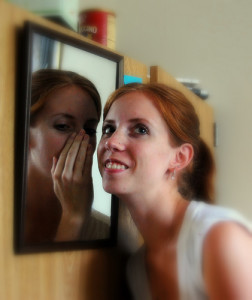It’s OK, Einstein talked to himself too.

Okay, this was U11 soccer and not actually as elegant as I describe. But while we were clearly outmatched in size and speed by the older U12 team we were playing, we eventually won the game decisively simply through superior team play, passing and handling skills. From what I could see, the boys never hesitated in their confidence despite what could have been an intimidating first half playing a bigger team.
In the words of performance coach Jaki Hitzelberger, she would call this the difference between proactive and reactive confidence. Reactive confidence is confidence built by responding to external conditions like a poor warm-up, the first few plays of the game, or the size and demeanor of the opposition. Whereas proactive confidence originates from the internal mindset of the player. Players with proactive confidence have stable confidence throughout the game, focus on their strengths, trust their teammates and visualize success before the game even begins.
High performers often do something else people may regard as odd or strange. They talk to themselves. Einstein famously didn’t talk at all until about four years of age and then began talking by often quietly muttering sentences to himself. An interesting recent study discovered that people who talk to themselves about what they are trying to accomplish, or trying to find, are more successful than those who don’t.
And as Dan Coyle reminds us here, how you talk to yourself matters a great deal. The most effective phrasing turns negative stress into positive challenge.
Before any meeting, interaction, activity or game, remember Jaki’s advice to remain confident despite changing circumstances or early failures, trust your teammates and colleagues, and visualize success. Try saying these things out loud too.



